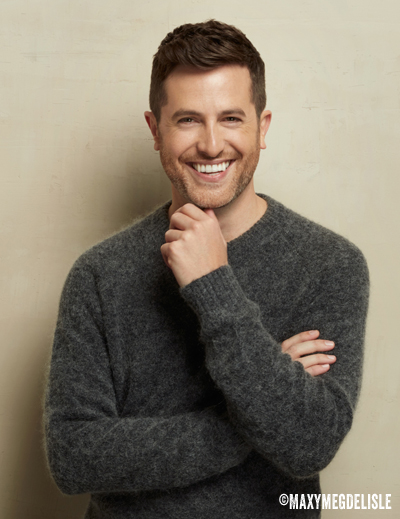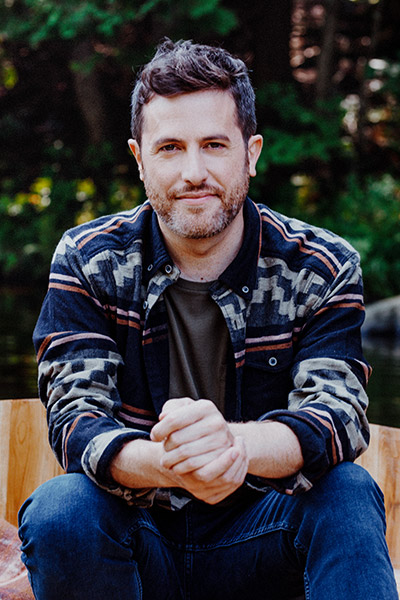Jean-Philippe Dion, Spokesperson and Livia Martin Spokesperson for the 2023 awareness campaign
October 2023

Photographe Dariane Sanche @ds_sanchez
Mental health has always been a subject close to my heart. These days, I find it hard to believe that there’s still so much stigma surrounding mental health and asking for help. I also think it’s important to recognize the role of allies. Anyone in recovery will tell you that without the support of those around them, the process would have been much more difficult. They’re part of the solution!
When Jean-Philippe from the CAP santé mentale asked me to be the spokesperson for this year’s awareness campaign, I was touched that they were thinking of me to carry this message, and it felt only natural for me to accept. I’m happy to be the voice of young allies who don’t yet fully recognize themselves, who are unaware of their emotions and needs, and who don’t dare ask for help. Youth is a really important period in our development, and having support when you’re dealing with someone living with a mental health problem on a daily basis can really make a difference.
I hope I can make a difference and effect change in the outlook of young people, encouraging them to ask for help.
Livia Martin
Spokesperson for the 2023 awareness campaign

@AlexisGR
“Challenge your views”: young people are invited to adopt a different outlook of mental health and to seek help
I’m excited to have Livia join us in our efforts to raise awareness about mental health among young people. I hope her message will be heard because it’s important to listen to young people. Their worries and suffering are just as important as anyone else’s. Young allies can count on the CAP santé mentale to help them gain some clarity and get the support they need!
Jean-Philippe
October 2022

@AlexisGR
Behind every face, there’s a story… For every person, there’s a solution!
We are using this wonderful slogan to launch the next CAP santé mentale campaign! I don’t know about you, but I quickly realized that, as close loved ones, we all have different ways of dealing with the mental health disorders of the people we care about. My father, sister and I all had different ways of reacting. I remember that I needed to feel useful. But how do you help a person who sometimes refuses to be helped? That was the challenge. We need to be able to adapt our support to our loved one’s reality and to our ability to manage the pressure and stress of crisis or difficult situations. It can take time, but we do get there. Believe me. It’s best to avoid guilt, as it gets us nowhere. The road to recovery can be rocky, but together we take it one step at a time.
Thanks to all of us, mental health is no longer the taboo it once was. I want to believe that our call for help has been heard. Specialized resources and qualified counsellors are here to help us find solutions adapted to our own situation and that of our loved ones. We need to knock on doors for the loved one, relative or friend we are helping, but we must also seek the support that allows us to help others.
This fall, we are launching a great new tool to help us live a balanced life by giving a voice and a face to the different situations we may encounter. Users will be able to identify with the people in the testimonials and click on the path they wish to discover. Four testimonials, 12 informational videos and an interactive map will provide a way to quickly locate local resources for all loved ones who are supporting a person living with a mental health disorder. We will need your help to spread the word about this great tool and share it with others!
In closing, I would like to congratulate you for all that you accomplish and the help you bring to the people around you. When I meet each of you, you tell me your stories, your challenges and your successes, and I think you are all wonderful.
I am proud to be your spokesperson.
Jean-Philippe
October 2021

@AlexisGR
Self-recognition
Who hasn’t scrolled through their Facebook or Instagram account watching the lives of other people. Let’s face it, we’ve all compared ourselves to others. Behind this (sometimes unhealthy) behaviour, is a search for role models, a reaching out for people who share similar experiences. When it comes to mental health, it’s comforting to know that there are other people going through the same experiences as us, that we are not alone and that we are not being selfish in wanting help. We need it so we can better support those we love.
In the touching Garder le CAP documentary, we hear from people like us who are caring for someone with a mental health problem.
After 30 years of caring for my mother and others around me, I was extremely touched to hear the testimonials of Joany, Dave and Marie. I felt validated. Some of their comments rang particularly true, like when Joany said, “You don’t choose to be born with it (…), but you have to learn to adapt.” Director Maxime Pelletier-Huot captured heartfelt testimonials that will remind you that, in order to continue to help, you must stay healthy, and you must not forget yourself.
Because you matter too!
Mental health has never been more relevant in our discussions. I want us to take the time to talk to the people around us to see how they are doing. “How are you” should not just be a simple greeting. It should be a genuine question.
The teaching guide for this documentary aims to create dialogue around the experiences of young people who provide support for a person living with a mental health problem.
Just like Joany, Dave and Marie, there are thousands of young people in Quebec who know someone who is living with a mental health problem. Their daily lives are both similar and different, as each person has their own history, challenges and coping mechanisms.
Even though people are more open and compassionate today, these young people still experience the stigma that surrounds mental illness. Because stigma is the main barrier to seeking help, we must make sure to reach them where they are to break their isolation, regardless of whether that is in a school setting, at work, or in everyday life.
It is important to recognize their needs and provide them with all the resources they need to live a fulfiled life and help them to stay on track.
Jean-Philippe Dion, CAP santé mentale spokesperson
October 2020
What a year!
A year ago, we could never have imagined that our world would be turned upside down like this. To get through these challenging times, it takes a certain ability to adapt, and I must say that it was put to the test! Wow! There is no denying that the pandemic has had a major impact on our lives and its repercussions are still being felt on our mental health. This is why it is vital that we take special care of ourselves.
For those who are part of the lives of people with mental illness, the challenges are many and even day-to-day life can feel like a roller coaster ride.
Since 2017, I have proudly served as a spokesperson for CAP santé mentale. Having supported my wonderful mother for 25 years, I know how much we, families, friends, colleagues, partners, and others, need help to learn to cope with this reality. Added to my personal story are those of many others whose testimonies I have read and hear over the past three years. Each experience reminds me of how lost you can feel when you’re in the eye of the storm.
Unfortunately, this is especially true for youths between the ages of 18 to 25.
Last year, during my conferences in Montreal and Quebec City, I met several young people who told me about their daily lives and the social pressure from their friends, their move to a new city, their studies, their work, their desire to be perfect, their search for identity… and I recognized myself in them. At this age, thinking about our own mental health often comes second. Doubts, guilt, frustration, and worries should not be experienced alone. There are resources to help.
That’s why this year we’re back with Mental Illness Awareness Week called Unfiltered Help which is aimed primarily at 18-to-25-year-olds.
What is unfiltered help?
- It is the ability to accompany one’s loved one in the recovery process.
- It is a reminder of how important it is for friends and family to speak openly about their experiences.
- It is breaking down awful prejudices and taboos.
- It is also being able to set boundaries that help to preserve balance.
I am involved with CAP santé mentale because I believe that all members of the immediate and extended family are part of the solution in their loved one’s recovery. However, you need to be able to equip yourself to weather the storm while preserving your mental health.
This year, we will go even further to get the message across. If you are between 18 and 25 years old, we have several tools that you can find on our website capsantementale.ca. You will find information sheets as well as a guide created by Le Laboratoire LaPProche in collaboration with CAP santé mentale.
You can also listen to our unfiltered podcasts (in french) which address different facets of being a loved one of a person with a mental illness.
These resources can help answer some of the questions you may have including :
- How can I support my loved one while thinking about my future?
- How do I navigate school, work, and home situations? How do I find my balance?
- How do I discuss the situation? What to do and how to do it?
- What help is available to me?
- How can I overcome my own prejudices?
- I feel a bit lost in my responsibilities. I don’t know if I’m doing too much or not enough…
- I’m afraid to talk about it with my parent. What can I do?
Don’t forget to enter our mask creation contest available on our social networks in October. You could win a great gift!
Join us in making a difference!
For the not so young (like me), we are launching a collective challenge, because “Alone we go faster, together we go further.”
Whether you are at home, at work or with friends, talk openly about the importance of taking care of your mental health. Be attentive to the young adults around you. Spend time with them so you can be aware of their concerns and questions. Remember what an important time in their life this is. This is even more true when supporting a loved one with a mental illness. Encourage them to seek help to support them in their role as an assistant.
There is still a lot of work to be done in recognizing the essential role of families and friends of a loved one with a mental illness. Remember one key thing—CAP santé mentale is here for you.
Thank you for partnering with us!
Jean-Philippe Dion
Spokesperson
October 2019
 This year, we decided to do things differently to celebrate Mental Illness Awareness Week. We went to meet with young people aged 18 to 25 at universities in Quebec City and Montreal. As I prepared for these conferences, I thought I was going to find out that mental health is no longer a taboo among young people and how aware students are of this terrible illness. I was wrong. There is still work to be done in encouraging young people to talk about their health, and for those who accompany them, to think about asking for support. Not only is mental illness the leading cause of hospitalization among 15- to 24-year-olds, but they are also less likely to seek professional help. There is help available both in the schools and in the community, but I am told that it is difficult to spread awareness about these resources.
This year, we decided to do things differently to celebrate Mental Illness Awareness Week. We went to meet with young people aged 18 to 25 at universities in Quebec City and Montreal. As I prepared for these conferences, I thought I was going to find out that mental health is no longer a taboo among young people and how aware students are of this terrible illness. I was wrong. There is still work to be done in encouraging young people to talk about their health, and for those who accompany them, to think about asking for support. Not only is mental illness the leading cause of hospitalization among 15- to 24-year-olds, but they are also less likely to seek professional help. There is help available both in the schools and in the community, but I am told that it is difficult to spread awareness about these resources.
In Quebec City, I had the privilege of hearing from Cathy. A wonderful and expressive person whose story is somewhat similar to mine. She grew up with a mom who had mental health issues. The difference is that Cathy “crashed.” She didn’t have help. Today, mother and daughter are doing well. Cathy’s mother returned to the workforce after 25 years of absence. That’s quite a victory!
In Montreal, I met Emmanuelle. She shared her own story with courage and aplomb. She is a young woman facing the challenges of living with an illness. The difficulty of finding the right help as she transitioned from childhood to adulthood was especially challenging. Today, Emmanuelle is proof that mental health is not an obstacle to success—either professionally or when it comes to finding love.
To enable people like Cathy and Emmanuelle to move forward in their recovery, we must learn to team up with them. To achieve this, family members must also learn to maintain their balance and not be afraid to ask the kind of questions that help us to understand mental illness.
The best way to do this is to seek help from an CAP santé mentale member affiliate. We must continue to promote our work because it is essential. This is our task for the coming months.
Jean-Philippe
Proud CAP santé mentale spokesperson
October 2018

I was 10 years old. I had everything I needed to be happy. Loving parents. A beloved sister. A close-knit family. My mother had explained to me that she had her first bout of depression when I was born. I wasn’t sure what that meant, but I knew that my mom was the most important person in the world. I needed her. One day, she started having “strange” thoughts. I could tell she didn’t have the same sparkle in her eyes or the same smile (which I inherited). I used to go to school scared. I had a lump in my throat on the bus and during my math class… That lump was still there on the way home. I didn’t know who to talk to about it or how to act with my mother. For more than 20 years, I have lived with an extraordinary mother, but one who suffers far too often.
I was introduced to the world of show business. I realized my childhood dream of being a TV and radio host. Who would have thought! The determination my mom had in battling her illness showed me to never give up. I persevered.
When CAP santé mentale reached out to me about becoming a spokesperson for the organization, something clicked. I realized that by accepting this offer, I could use skills gained through my work as a host to raise awareness for this very personal cause. I know how hard it can be to accompany someone you love in their suffering. We feel helpless, powerless, responsible and sometimes guilty. I understand your periods of worry, stress, confusion and discouragement, but also your feelings of pride in your loved one’s progress.
I agreed to join the CAP santé mentale team because I deeply believe that families need help learning how to deal with a reality that is still rife with prejudice and taboo. You have to be equipped to deal with this terrible illness.
Everyone who is involved with someone with a mental illness can be part of the solution in their loved one’s recovery. I implore people of all ages who are affected by the mental illness of a loved one to contact a CAP santé mentale member affiliate immediately.
For those of you who are part of the solution, this informational booklet will put you on the right track. Remember, you are one of the keys to your loved one’s recovery! Love them. They need it. Long live CAP santé mentale!
Jean-Philippe Dion,
host and producer
Official Facebook page






